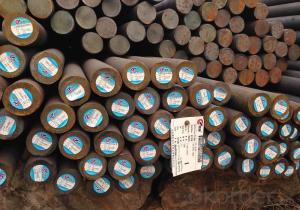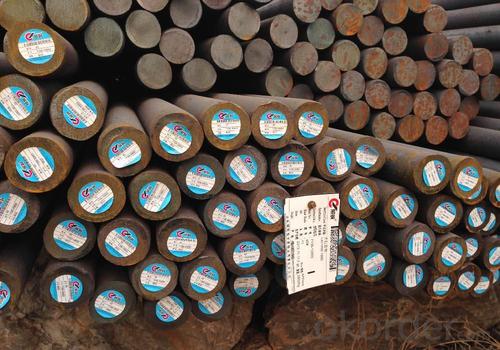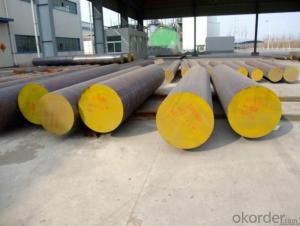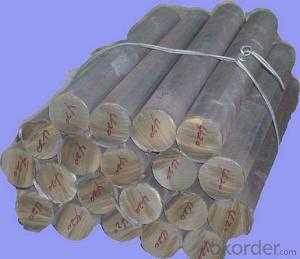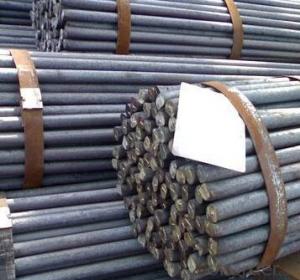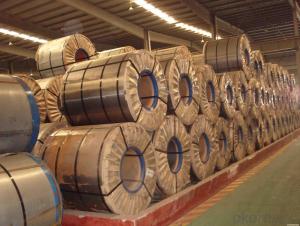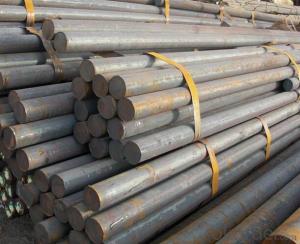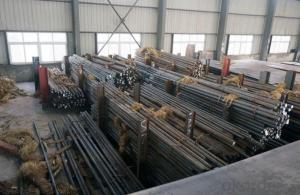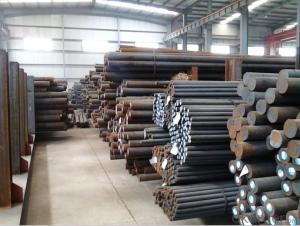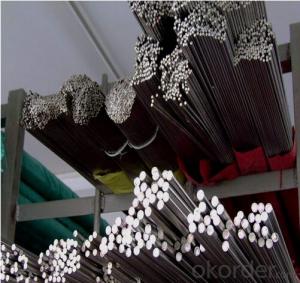Special Steel 42CrMo/1.7225/4140 High Carbon Steel
- Loading Port:
- China main port
- Payment Terms:
- TT OR LC
- Min Order Qty:
- 25 m.t.
- Supply Capability:
- 10000 m.t./month
OKorder Service Pledge
OKorder Financial Service
You Might Also Like
Specification
Chemical Composition(%)
| C | Si | Mn | Cr | Mo | Ni | P | S |
| 0.38-0.45 | 0.17-0.37 | 0.50-0.80 | 0.90-1.20 | 0.15-0.25 | ≤0.030 | ≤0.030 | ≤0.030 |
Standard
| GB | AISI | DIN | JIS | ISO |
| 42CrMo | 4140 | 42CrMo4 | SCM440 | 42CrMo4 |
Available Size
| Rolled round bar | φ20-120mm × L |
| Forged round bar | φ130-195mm × L |
Heat Treatment
| Item | Temperature℃ | Hardness |
| quenching | 840-880 | HRC32-34 |
| tempering | 580 | |
| quenching | 900 | HRC54-60 |
| tempering | 150-180 |
Characterstics
| The steel with high strength and toughness, hardenability is better also | |||||||
| After conditioning treatment quenching deformation of small | |||||||
| high fatigue limit and repeated impact resistance |
Applications
The steel is suitable for manufacturing requires a certain strength and toughness of large and medium-sized plastic mold
Product show:

Workshop show:

FAQ:
1, Your advantages?
professional products inquiry, products knowledge train (for agents), smooth goods delivery, excellent customer solution proposale
2, Test & Certificate?
SGS test is available, customer inspection before shipping is welcome, third party inspection is no problem
3, Payment Terms?
30% TT as deposit and 70% before delivery.
Irrevocable L/C at sight.
4, Trading Terms?
EXW, FOB, CIF, FFR, CNF
5, After-sale Service?
We provides the services and support you need for every step of our cooperation. We're the business partner you can trust.
For any problem, please kindly contact us at any your convenient time.
We'll reply you in our first priority within 24 hours.
- Q: What are the different surface finishing methods used for special steel?
- Special steel can be subjected to various surface finishing methods, each serving a distinct purpose and yielding different outcomes. The most commonly employed surface finishing techniques for special steel comprise: 1. Grinding: By utilizing abrasive materials, grinding eliminates excessive material from the steel's surface. This method is primarily employed to attain a polished and sleek finish, while also eradicating any imperfections or roughness. 2. Polishing: By utilizing abrasive materials and polishing compounds, polishing creates a smooth and lustrous surface on the steel. This technique is frequently utilized to enhance the steel's visual appeal and bolster its resistance against corrosion. 3. Shot blasting: Shot blasting involves propelling small metallic or mineral particles onto the steel's surface at high velocities. This process effectively eliminates any impurities, rust, or scale, resulting in a clean and uniform finish. 4. Electroplating: Electroplating involves depositing a thin layer of metal onto the steel's surface via an electrochemical reaction. Commonly employed to improve the steel's appearance, corrosion resistance, and provide a decorative or protective coating. 5. Passivation: Passivation, a chemical process, entails treating the steel's surface with an acid solution to eliminate impurities and create a passive layer that resists corrosion. This method is frequently employed to enhance the corrosion resistance of stainless steel and other alloys. 6. Coating: Coating refers to the application of a protective layer or coating onto the steel's surface. This can involve utilizing paints, lacquers, enamels, or other protective coatings to prevent corrosion, enhance durability, or achieve a specific aesthetic finish. It is crucial to note that the selection of a surface finishing method for special steel heavily depends on the desired outcome, ranging from aesthetics to corrosion resistance or functionality. Furthermore, the specific characteristics of the steel, including its composition, hardness, and intended application, significantly influence the most suitable surface finishing method.
- Q: Can special steel be used in the production of gears?
- Yes, special steel can be used in the production of gears. Special steel, such as alloy steel or tool steel, is often preferred in gear manufacturing due to its high strength, wear resistance, and ability to withstand heavy loads and high temperatures. This steel type ensures gears have the necessary durability and performance required for various applications.
- Q: How does special steel perform in electrical conductivity applications?
- Special steel, also known as stainless steel, offers excellent electrical conductivity properties in various applications. It is widely used in electrical engineering and electronics due to its high corrosion resistance and low electrical resistance. The addition of specific alloys such as chromium and nickel enhances its conductivity, making it an ideal choice for conducting electricity efficiently. In electrical conductivity applications, special steel exhibits low resistivity, allowing for the smooth flow of electrical current without significant loss of energy. Its low resistance minimizes the generation of heat, which is crucial for preventing overheating and ensuring the efficient operation of electrical components. Special steel also possesses excellent magnetic properties, making it suitable for applications that require both electrical conductivity and magnetic strength. This property is particularly useful in the production of transformers, motors, and generators. Moreover, special steel is highly durable and can withstand harsh environmental conditions, making it suitable for outdoor applications. Its corrosion resistance prevents the formation of rust, ensuring a long lifespan and consistent performance even in challenging environments. In summary, special steel is an excellent choice for electrical conductivity applications due to its low electrical resistance, high corrosion resistance, and exceptional durability. Its unique properties make it a preferred material in various industries that rely on efficient and reliable electrical conductivity.
- Q: Can special steel be used for luxury goods?
- Yes, special steel can definitely be used for luxury goods. Special steel, known for its exceptional durability, strength, and unique properties, can be utilized in the production of high-end luxury goods such as watches, jewelry, knives, and even high-performance vehicles. Its superior quality and aesthetic appeal make it an ideal choice for manufacturers seeking to create luxurious and exclusive products.
- Q: What are the different molding grades of special steel?
- The different molding grades of special steel include tool steel, stainless steel, high-speed steel, and alloy steel.
- Q: Can special steel be used in cryogenic applications?
- Yes, special steel can be used in cryogenic applications. Special steels, such as stainless steels, are known for their excellent resistance to low temperatures and can maintain their mechanical properties even at extremely cold temperatures. This makes them suitable for use in cryogenic applications where materials need to withstand and perform well in extreme cold environments.
- Q: Can special steel be used in corrosive environments?
- Yes, special steel can be used in corrosive environments. Special steel alloys are specifically designed to have enhanced resistance to corrosion caused by various elements such as moisture, chemicals, or saltwater. These alloys are carefully formulated with specific elements, such as chromium or nickel, which create a protective layer on the surface of the steel, preventing or minimizing corrosion. As a result, special steel is widely utilized in industries such as marine, oil and gas, chemical processing, and wastewater treatment, where exposure to corrosive environments is prevalent.
- Q: How long does special steel typically last in various applications?
- The lifespan of special steel in various applications can vary depending on several factors. Special steel is known for its exceptional strength, durability, and resistance to corrosion, making it suitable for a wide range of applications. However, the actual lifespan of special steel will depend on the specific application, maintenance practices, and environmental conditions it is exposed to. In general, special steel can last for several decades or even longer when used in industries such as construction, automotive, aerospace, and manufacturing. For instance, in building structures, special steel can last for 50 to 100 years, thanks to its robustness and ability to withstand extreme loads and weather conditions. In automotive applications, special steel components like engine parts, suspension systems, and body frames can have a lifespan of 15 to 30 years, given that they are properly maintained and not subjected to excessive wear and tear. When it comes to the aerospace industry, special steel is commonly used in critical components like turbine blades, landing gears, and fuselage structures. These parts undergo rigorous testing and inspection procedures and are designed to last for decades, typically around 30 to 50 years, before requiring replacement or refurbishment. In manufacturing processes, special steel tools and dies can have a lifespan ranging from a few years to several decades, depending on the intensity of use, the material being processed, and the maintenance practices employed. Proper lubrication, cooling, and regular maintenance can significantly extend the lifespan of these tools. It is important to note that the lifespan of special steel can be adversely affected by factors such as exposure to harsh chemicals, high temperatures, aggressive environments, or inadequate maintenance. Therefore, regular inspections, maintenance, and adherence to recommended usage guidelines are crucial in ensuring the longevity of special steel in various applications.
- Q: How does special steel compare to other materials such as aluminum or titanium?
- Special steel, when compared to other materials such as aluminum or titanium, offers a unique set of advantages and characteristics. Firstly, special steel is known for its exceptional strength and durability. It has a higher tensile strength compared to aluminum and titanium, making it ideal for applications that require withstanding heavy loads or high-stress environments. This strength also provides resistance against wear and tear, ensuring a longer lifespan of the material. Another significant advantage of special steel is its ability to maintain its mechanical properties at extreme temperatures. While aluminum and titanium may experience a significant decrease in strength at elevated temperatures, special steel retains its structural integrity, making it suitable for applications that involve high temperatures or thermal cycling. In terms of cost-effectiveness, special steel often proves to be more affordable than titanium, especially in large-scale production. Although aluminum is generally cheaper than special steel, it may not possess the same level of strength or resistance to corrosion, which could limit its applicability in certain industries. Moreover, special steel has excellent machinability and can be easily formed into different shapes and sizes, allowing for greater design flexibility. This quality makes it suitable for various industries such as automotive, aerospace, construction, and manufacturing, where complex components or structures are required. Lastly, special steel exhibits superior corrosion resistance compared to aluminum and titanium. It can be treated or coated to provide additional protection against rust and other forms of degradation, extending its lifespan even further. In summary, special steel outperforms aluminum and titanium in terms of strength, durability, temperature resistance, and corrosion resistance. Its cost-effectiveness, machinability, and versatility make it a preferred material in various industries, where high-performance and reliability are crucial factors.
- Q: What are the main applications of special steel in the textile industry?
- Special steel is used in the textile industry primarily for manufacturing textile machinery components. It is utilized to produce high-quality parts and tools like knitting needles, loom parts, and various cutting and shaping equipment. The strength, durability, and resistance to wear and tear of special steel make it an ideal material for these applications, ensuring the efficient and reliable operation of textile machinery in the industry.
Send your message to us
Special Steel 42CrMo/1.7225/4140 High Carbon Steel
- Loading Port:
- China main port
- Payment Terms:
- TT OR LC
- Min Order Qty:
- 25 m.t.
- Supply Capability:
- 10000 m.t./month
OKorder Service Pledge
OKorder Financial Service
Similar products
Hot products
Hot Searches
Related keywords
